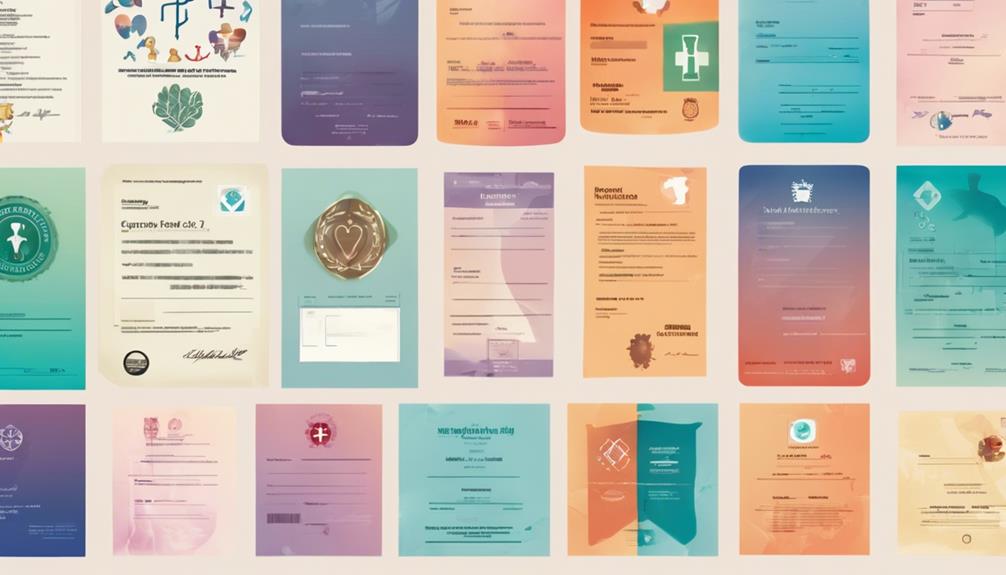The cost of a health certificate typically ranges from $50 to $200. This variation depends on factors like the type of certificate you need, specific testing, and vaccinations required. For instance, pet health certificates or international travel certificates often involve different fees. Geographic location also plays a role; urban areas may charge more than rural clinics. Additional charges might apply for expedited services or extra documentation. If you're evaluating costs, it's wise to check local regulations and consult with your vet for accurate pricing details that apply to your situation. More insights await you on getting the best health certificate.
Types of Health Certificates

There are several types of health certificates, each serving a specific purpose and catering to different needs.Is Pilates And Yoga The Same
One common type is the pet health certificate, which verifies that your pet is healthy and up to date on vaccinations. This certificate is often required by boarding facilities, groomers, or during travel within the country.
If you're planning to take your pet overseas, you'll need an international travel certificate. This document not only confirms your pet's health status but also guarantees compliance with the regulations of the destination country. It typically includes details about your pet's vaccinations, any required tests, and the veterinarian's signature.
Different jurisdictions may have specific requirements, so it's crucial to check the rules for your destination before traveling. Some countries might also require additional documentation, like proof of parasite treatments or rabies vaccinations.
Factors Affecting Costs
Various factors influence the costs of obtaining a health certificate, including the type of certificate required, your location, and the veterinarian's fees.
The health certificate necessity varies based on your destination and specific travel health regulations. For example, some countries mandate certificates for pets or livestock, while others may have more lenient rules.
Your geographic location can also play a significant role in the overall cost. Urban areas typically have higher veterinary fees compared to rural locations, and this disparity can affect how much you pay for the health certificate. Additionally, the urgency of your request may lead to extra charges. If you need the certificate quickly, be prepared for a rush fee.
Furthermore, different types of health certificates come with varying price tags. A standard certificate may cost less than one that requires extensive testing or vaccinations.
Always check with your veterinarian to understand the specific requirements for your situation. By considering these factors, you can better estimate the total costs involved in acquiring a health certificate for your travel needs.
Medical Examination Fees

When considering medical examination fees, you'll find that typical examination costs vary widely based on location and provider.
Additionally, be aware that you might incur extra expenses for any required tests beyond the standard exam.
It's also important to check your insurance coverage options, as they can greatly influence your overall costs.
Typical Examination Costs
Medical examination fees can vary considerably based on factors like location, type of exam, and specific requirements. Typically, you can expect to pay between $50 to $200 for a standard medical exam. This often includes typical examination procedures such as a physical exam, blood pressure check, and basic lab tests.
For common health concerns, like evaluating fitness for a job or obtaining a health certificate for travel, costs may differ. If you're seeking specific evaluations related to a medical condition, the fees could be higher.
Additionally, some clinics offer package deals that cover multiple services, which can be more economical. If you're in a metropolitan area, the prices might lean towards the higher end due to increased overhead costs. In contrast, rural clinics might offer lower rates.
Always check with the clinic in advance for a detailed breakdown of what's included in the fee. Understanding these costs can help you budget better and guarantee you're prepared for any additional expenses that may arise.
Additional Testing Expenses
Additional tests during a medical examination can considerably increase your overall costs, especially if specific evaluations or lab work are required.
It's crucial to understand the testing requirements for your health certificate, as these can vary depending on your destination or purpose. Common additional tests may include blood work, chest X-rays, or screenings for specific diseases, all of which come with their own fees.
When you schedule your medical exam, it's wise to inquire about any potential unexpected fees associated with these additional tests. Sometimes, the clinic mightn't disclose all costs upfront, leading to surprises when you receive the bill.
Be proactive in asking what tests may be necessary based on your health history or travel plans, and request a breakdown of costs related to each test.
Insurance Coverage Options
Many insurance plans may cover some or all of the fees associated with the medical examination for your health certificate, so it's important to review your policy.
Start by checking if your plan includes provisions for preventive services, as many do. If your health examination falls under these services, you might find that your out-of-pocket expenses are minimal or even nonexistent.
Next, pay attention to the coverage limits specified in your plan. Some insurance plans have caps on how much they'll reimburse for specific services, including medical exams. If you exceed these limits, you could be responsible for the remaining costs.
Additionally, keep in mind that certain plans may require you to use in-network providers to maximize your benefits.
If your insurance doesn't fully cover the exam, consider discussing payment options with your healthcare provider. Many clinics offer sliding scale fees or payment plans that can help ease the financial burden.
Ultimately, being proactive about understanding your insurance coverage can save you money and streamline the process of obtaining your health certificate.
Laboratory Test Expenses
Laboratory test expenses can vary considerably based on the type of tests required and the facility you choose. Different laboratory test types, such as blood tests, urinalysis, or imaging studies, come with differing costs. Typically, more complex tests or those that require specialized equipment can lead to higher expenses.
When you're getting a health certificate, it's essential to understand that the cost of these tests may not be covered by your insurance, depending on your policy. Always check your coverage beforehand to avoid unexpected expenses.
Another factor to take into account is the test result timelines. Some tests provide results within hours, while others may take several days. If you need your results quickly, be prepared for potential additional charges, as expedited services often come at a premium.
Additional Documentation Charges

When obtaining a health certificate, you should be aware of additional documentation charges that can impact your total costs.
These may include certificate issuance fees, travel requirement costs, and any extra testing expenses needed for compliance.
Understanding these charges upfront can help you budget more effectively for your health certification process.
Certificate Issuance Fees
Certificate issuance fees vary based on the type of health certificate you need and any additional documentation required. Typically, the costs can range from $50 to $200. If you require a standard health certificate, the fee may be on the lower end. However, more specialized certificates, such as those needed for certain professions or travel, generally incur higher fees.
You should also be aware that processing time can influence these costs. If you need your certificate urgently, expedited services are often available for an extra fee. This can notably streamline the process, ensuring you receive your documentation in a timely manner.
Additionally, the certificate validity period can affect the fees as well. Some certificates are valid for longer durations, while others may need renewal sooner, leading to potential additional costs over time.
Travel Requirement Costs
Travel requirements often come with additional documentation charges that can greatly increase your overall costs. When planning your trip, it's crucial to factor in these expenses, especially if you need specific health certificates to comply with travel health regulations. Various destinations impose different requirements, and you may need to secure multiple documents, each with its own fees.
You should also consider the certificate validity duration, as many health certificates have a limited timeframe for use. If your travel plans change, you might find yourself needing to obtain a new certificate, incurring further costs. Additionally, some countries require notarization or authentication of documents, which can add extra charges.
It's wise to research the specific requirements for your destination well in advance. Understanding the documentation needed can help you anticipate costs and avoid unexpected fees.
Don't forget that expedited services often come with a premium, so if time is of the essence, you'll need to budget accordingly. By planning ahead and being aware of these additional documentation charges, you'll navigate the travel regulations smoothly and keep your costs manageable.
Additional Testing Expenses
You may face additional testing expenses that can quickly add up, depending on your destination's health requirements. These unexpected expenses often include costs for vaccinations, diagnostic tests, or laboratory results that must be completed within a specific certification timeline.
For instance, some countries require proof of vaccinations, like yellow fever or COVID-19, which can incur charges for both the vaccine and the necessary documentation. Additionally, you might need blood tests or other medical evaluations, leading to more fees that you mightn't have budgeted for.
It's essential to research the health regulations of your destination well in advance. This way, you can prepare for these potential costs and avoid last-minute surprises.
Keep in mind that some tests may need to be performed a certain number of days before your departure, so planning and scheduling these appointments early can help you manage your budget more effectively.
Regional Price Variations
Prices for health certificates can vary considerably across different regions, influenced by local regulations, demand, and the services offered by healthcare providers.
When you're looking into regional pricing, it's vital to recognize that urban areas often have higher costs due to the concentration of healthcare facilities and greater demand. Conversely, rural areas may offer lower prices, but that can depend on the availability of services.
When making certificate comparisons, you'll find that some regions require additional documentation or specific tests, which can drive up costs. For instance, states with stricter animal health regulations may charge more for certificates due to the added requirements.
Additionally, the type of healthcare provider you choose—be it a private clinic or a public health facility—can also impact the price.
Make sure to research local options and get quotes from multiple providers to guarantee you're getting the best deal for your health certificate. Understanding these regional variations will help you navigate the costs effectively and avoid unexpected expenses.
Always consider the local context when budgeting for these essential documents.
Tips for Budgeting

When budgeting for a health certificate, it's important to account for not only the certificate fee but also any associated costs like tests or additional documentation that may be required. Start by researching the total costs in your area, including the price of necessary vaccinations or lab tests. This will give you a clear picture of what to expect.
Next, implement effective budgeting strategies. Allocate funds specifically for the health certificate within your overall financial planning. Consider setting aside a little extra in case of unexpected expenses. If you know you'll need the certificate by a certain date, break down the costs and create a timeline for when to pay each expense.
Additionally, keep track of all expenses related to the certificate. Use budgeting apps or spreadsheets to monitor your spending and adjust as needed. By being organized, you'll avoid overspending and guarantee you have the necessary funds when the time comes.
Conclusion
In conclusion, understanding the costs associated with health certificates can help you budget effectively.
By considering the type of certificate you need, the medical examination fees, and any laboratory tests required, you can better anticipate expenses.
Don't forget about additional documentation charges and regional price variations that may impact your final costs.
With careful planning, you can navigate the process smoothly and guarantee you have the necessary health certificate without unexpected financial surprises.
